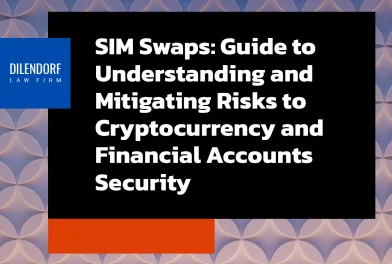Wire fraud refers to the illegal use of electronic communications, such as email or wire transfers, to defraud individuals or businesses. Composed of attorneys from various practice groups, Dilendorf Law Firm professionals can provide legal representation in court and help clients, who have been a victim of wire fraud, recover any losses they may have incurred. Additionally, we assist clients in taking preventative measures to protect themselves from future instances of wire fraud.
Wire fraud can take many forms, but common methods include phishing scams, business email compromise (BEC) scams, and spear-phishing attacks.
In a phishing scam, a perpetrator sends an email or text message that appears to be from a legitimate source (such as a bank or a government agency) and asks the recipient to click on a link or provide personal information. Once the recipient clicks the link or provides their information, the perpetrator can use it to gain access to their accounts and steal their money.
A Business Email Compromise (BEC) scam is a type of wire fraud that targets businesses. The scammer will impersonate a high-level executive or vendor and tricks employees into sending sensitive information or wiring funds.
Spear-phishing is a targeted form of phishing where the attacker specifically targets an individual or organization and uses personal information to gain their trust.
Wire fraud can be difficult to detect and can cause significant financial losses. It’s important for individuals and organizations to be aware of these types of scams and to take steps to protect themselves, such as being skeptical of unsolicited emails and texts, and not clicking on links or providing personal information without verifying the identity of the sender.
Wire fraud can be dangerous for a number of reasons:
- Financial Losses: Wire fraud can result in significant financial losses for individuals and organizations. Victims of wire fraud may lose their savings, retirement funds, or even their entire business as a result of fraud.
- Privacy Invasion: Wire fraud can also result in the invasion of privacy, as perpetrators may gain access to sensitive personal information such as Social Security numbers, bank account numbers, and other sensitive data.
- Difficulty in detecting: Wire fraud can be difficult to detect, as scammers use sophisticated methods to trick victims. They may use spoofed email addresses and websites that look legitimate, making it hard for victims to tell that they are being scammed.
- Damage to personal and professional life: Wire fraud can have a significant impact on an individual’s personal and professional life, affecting their credit score, financial stability, privacy and can cause mental stress.
- Cybercrime: Wire fraud can also be used as a tool for cybercriminals to gain access to other sensitive information or steal money, as well as for cyber espionage.
- Legal action: Victims of wire fraud may also face legal action if they unknowingly participate in illegal activities as a result of the fraud.
It’s important for individuals and organizations to be aware of the potential risks associated with wire fraud, and to take steps to protect themselves and their assets. This includes being skeptical of unsolicited emails and texts, not clicking on links or providing personal information without verifying the identity of the sender, as well as having proper security measures in place such as multi-factor authentication and regular software updates.
At Dilendorf Law Firm, we help clients by providing legal advice and representation in the event of a wire fraud incident, and can also assist clients implement preventative measures to reduce the risk of wire fraud.










































